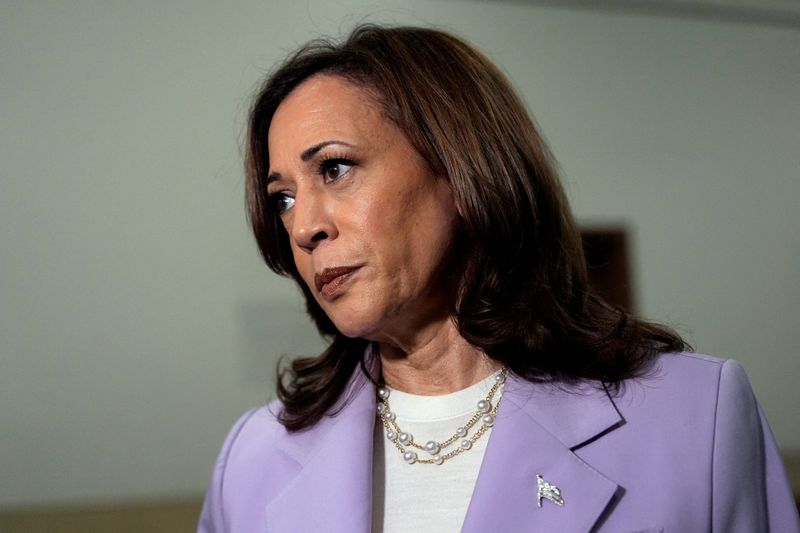Harris’ economic plan mirrors Biden’s, aims for lower taxes and prices
2024.08.16 07:27
By Nandita Bose
WASHINGTON (Reuters) – Kamala Harris is laying out proposals to cut taxes for most Americans, ban “price gouging” by grocers and boost affordable housing during her first major economy-focused speech as the Democratic presidential candidate on Friday.
The U.S. vice president is traveling to Raleigh, North Carolina, to outline an agenda for her first 100 days in office, where she will call for expanding the child tax credit to $6,000 for families with newborn children, cut taxes for families with kids and lower prescription drug costs, Harris campaign officials said.
She aims to draw a contrast with her Nov. 5 election opponent, Republican Donald Trump, on tariffs and taxes, they said. But she may also find her agenda runs into resistance from both corporations and Congress, who rejected similar proposals when they came from President Joe Biden.
Harris’ economic agenda broadly mirrors Biden’s and aims to appeal to a broad segment of the working public who often see Republicans as better economic stewards and are anxious over both higher costs and their economic prospects.
Some of her policies, including the ones on housing and groceries, have come under attack as ill-considered and overly liberal populism by Republicans and some industry groups.
Inflation fell to below 3% for the first time in nearly 3-1/2 years in July, but prices of groceries and consumer goods remain well above their pre-pandemic levels.
The Trump campaign has also been mulling new tax cuts for middle-class households, and Trump proposed eliminating taxes on tipped wages – something Harris did as well in Las Vegas last week.
Some progressive economic ideas poll well with voters, but they have proven tough to pass into law. Most of Harris’ and Trump’s economic priorities need to secure majority support in Congress. A child tax credit bill passed the House but stalled in the Senate this year.
Not all elements of Harris’ economic agenda will make it to the Friday speech. Her campaign wants to avoid dividing voters and attracting attacks from business groups over granular details, and will be “strategically ambiguous” in areas such as energy, her aides and advisers said.
Harris no longer supports measures from her short-lived 2020 presidential bid such as a fracking ban, or Medicare for All, that were meant to win progressive votes, her advisers said.
TWEAKING BIDEN’S POLICIES
The proposals are larger versions of price gouging, housing plans and tax cuts already introduced by Biden.
Harris’ plan will include “the first-ever federal ban on price gouging on food and groceries,” which her campaign says aims to stop big corporations from unfairly exploiting consumers while generating excessive corporate profits.
She will direct the Federal Trade Commission to impose “harsh penalties” on firms that break new limits on price gouging, campaign officials said.
She will also release a plan calling for 3 million new construction units, outline a series of tax incentives and other measures to encourage building homes for first-time homebuyers and offer a $25,000 credit for such buyers. Harris also aims to expand rental assistance, ban rental price-fixing and stop Wall Street firms from buying homes in bulk.
Harris will push to lower healthcare costs, cancel medical debt and tout how her administration negotiated down the prices of 10 top-selling prescription drugs used by Medicare by as much as 79%.

She will also draw contrasts with Trump on tax policy and tariffs and maintain Biden’s promise not to raise taxes on people who make $400,000 or less a year, her campaign said. Trump slashed the corporate tax rate to 21% from 35% and implemented other tax breaks that are set to expire next year.
Trump has promised to make the tax cuts permanent and suggested new across-the-board tariffs on imports, an idea Harris rejects. Trump’s campaign on Wednesday tied Harris to Biden’s economic record.








